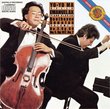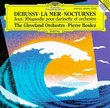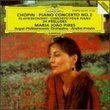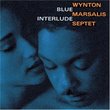| All Artists: Ludwig van Beethoven, Alfred Brendel Title: Beethoven: Favourite Piano Sonatas Members Wishing: 0 Total Copies: 0 Label: Philips Release Date: 1/18/1994 Genre: Classical Styles: Forms & Genres, Sonatas, Historical Periods, Classical (c.1770-1830), Romantic (c.1820-1910) Number of Discs: 2 SwapaCD Credits: 2 UPC: 028943873024 |
Search - Ludwig van Beethoven, Alfred Brendel :: Beethoven: Favourite Piano Sonatas
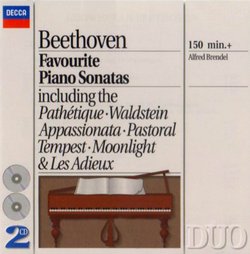 | Ludwig van Beethoven, Alfred Brendel Beethoven: Favourite Piano Sonatas Genre: Classical
|
Larger Image |
CD DetailsSimilar CDs
Similarly Requested CDs
|
CD ReviewsWith So Many Choices, A Clear Best-in-Show 10/23/2000 (5 out of 5 stars) "So, why this one, with so many out there? Well, if you are a pianist, you'd know that even if you've mastered one of these sonatas, it is difficult to have so many of them up to a 5-star standard. Horowitz' Appasionata is absolutely amazing! Rubinstein, late in his career, did such incredible things with the late sonatas. Barenboim's Moonlight will make you weep. Ashkenazy's Waldstein has the power it deserves. Murray Perahia makes the early sonatas sing!But Brendel knows Beethoven. He knows him better than all of these others combined. There is never an unBeethovenian mannerism, never a pause for effect not-intended, never a dynamic misplaced, a peddle-point missed, a trill given more attention than it deserves. This is "thinking man's Beethoven". (It bears some resemblance to Wilhelm Kempf's, but Brendel's sense of rhythm is better.) You will listen to the first 30 bars of Moonlight and think, "Well, where's the bravura? where's the beef?", and then after 60 bars you'll think again -- "how could it possibly be played in any other way?" And, after you've gotten the other recordings out of your system, you'll think the same of virtually all the selections.I won't throw out my Horowitz -- the students need to hear it. And I think I'd say the same of the earlier Barenboim recording. But for the rest -- after you own this one, you can dispense with them -- you've got all that you need." Beethoven's Most Popular Piano Works Alan Lekan | Boulder, CO | 01/26/2005 (4 out of 5 stars) "Before Beethoven, the solo piano compositions (piano sonatas) of Haydn and Mozart were more designed for teaching, parlor music or an occasional showing of virtuosity - but within the classical restraint of the Vieneese culture. After mostly following this model for some time, Beethoven threw off these restaints and unleashed an unheard-of level of power and virtuosity - pioneering piano compositions of great drama, emotional expression and wide, dynamic tones. The public loved this new musical expression, especially such early works as the Pathetique and the so-called "Moonlight" sonata. Where piano sonatas before were well-suited for the dilattante and amatuer, these were now reserved only for the most advanced pianist. It was with such piano sonatas that Beethoven first worked out his revolutionary musical concepts that paved the way for his later and greater symphonies, concertos and string quartets - leaving behind the restraints of the "Classical period" and forging the way to the more-emotive "Romantic period." Beethoven's seven most famous piano sonatas (the so-called "name sonatas") are on these two CD's. They are popular mostly because of the music is superb and changed the way the world looked at music at that time. These works (from Beethoven's "early" and "middle" periods until about 1801) are more popular and appealing to the average or newer listener than Beethoven's "lesser-accessible" and more turbulant later compositions. But, with so many recordings of these sonatas by so many of the great pianists to chose from, how does one decide? While for any individual sonata a certain performer may have recorded a spectacular reading, this 2-CD set by Alfred Brendel is - on a whole - excellent and highly rated. Gramophone Guide concluded of this DUO set, "These can be recommended without any reservations whatsoever." Brendel recorded three complete cycles of Beethoven's 32 sontatas. These are from Brendel's 1970's cycle (compared to the legendary first cycle on Vox or the most recent complete set recorded in the 1990's on Philips). As one of the legendary pianist of the 20th century, Mr. Brendel is recognized worldwide as one of the finest interpreters of Beethoven (and Schubert) and gives exceptional performances here that are recorded with very good sound. Each reading is compelling, well-conceived and full of suspenseful and dramatic unfolding (Penguin Guide refers to them as "authoritive"). In particular, his "Waldstein" and "Tempest" show an exciting and seamless train-of-thought that resonates in the mind long after. His "Pastoral" and "Les Adieux" are gorgeous and flow like a refreshing stream. Equally attractive are the slower movements of the "Pathetique" and "Moonlight" sontata where Mr. Brendel creates an alluring atmosphere that is quiet, passionate and tender - hardly fitting the description of "overly-intellectual" often used in reference to his style (maybe its the thick glasses?). His readings here are still among my favorite for their depth and masterful sense of direction and unfolding, but many great pianists have recorded these marvels that have their own allure. This DUO set of Brendel's Beethoven makes an excellent first purchase for those exploring Beethoven's piano sonatas especially with the value of the Philips DUO set. The sound is very good but shy of the best modern DDD recordings. Last, if you are looking for a first, COMPLETE SET of all Beethoven's 32 sonatas for piano, there are two great, "Super-Budget" choices from Bernard Roberts (Nimbus) or Claude Frank (Music & Arts). Both present Beethoven with balance and artistry and make good reference sets that are highly affordable (only about $25-30 on Amazon marketplace for the 10-CD set). Compositions - 5 stars; Performance - 5 stars; Sound quality - 4 stars." Superb Sonata Survey of Budget Beethoven David M. Garrett | San Antonio, Texas USA | 03/21/2005 (4 out of 5 stars) "Earlier recordings by Alfred Brendel hold a top spot in Gramophone's 2005 Classical CD Review, but while not at the top of the listing, this CD receives considerable praise at honorable mention. As always, individual sonatas have their respective, best interpreters (e.g., Rubinestein or Richter for Appassionata; Gilels for Waldstein); however, this is a rarely-found sampling by a recognized "great" pianist. In addition, collecting the pieces represented here would normally require the purchase of 2-3 individual CDs or a packaged cycle. Thus, this is a bargain value. Perhaps not the "first choice" for the musical purist or trained ear, nevertheless these recordings serve as a well-above-average collection of the most familiar Beethoven piano sonatas. Perfect for the classical listener wishing to (a) discover Beethoven piano music; (b) looking to fill in or diversify an existing collection or, (c) looking for a concise B+/A- collection of Brendal interpretations."
|

 Track Listings (13) - Disc #1
Track Listings (13) - Disc #1

